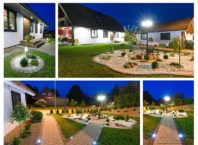Bee populations are falling worldwide, which is bad news for us humans, as bees are responsible for pollinating around 30% of our crops and 90% of wild plants. You can do your part for boosting bee numbers by making a few small changes to your garden. Follow the six simple tips below to make your garden more bee-friendly.
Let your garden go wild
Even if it’s just a little patch in the corner, letting your garden go overgrown provides an excellent habitat for bees and other beneficial insects. An undisturbed area of long grass, nettles and/or wild flowers is perfect, giving insects food and a breeding ground. It’s also great for attracting birds to your garden.

Grow more flowers, shrubs & trees
A minimal garden may look nice, but it doesn’t exactly give insects a chance to thrive. Instead, plant a variety of trees, flowers, shrubs and other plants, and don’t be over-zealous when it comes to trimming & cutting them.
Don’t be a control freak either – allow wild flowers to come in and grow where they please. It will give your garden an unpredictable splash of colour and and the extra variety is great for attracting bees & other beneficial bugs.
Make an insect hotel
You can build your own simple insect hotel using recycled materials like old pallets or unwanted furniture. Sections of bamboo, rocks, straw, rotting wood, bricks and old flower pots all make ideal habitats for bees, spiders, beetles and other useful bugs. It costs nothing to do, doesn’t take up much space and it’s a great activity to do with your kids. There are plenty of tutorials and ideas online, such as this one.

Don’t mow your lawn too often
It may go against all your instincts, but you should leave the mower in the garage and let your grass grow a little longer. You will probably get a scattering of daisies and dandelions across your lawn– the latter of which are a brilliant food source for bees.
Do not disturb
Figure out which parts of your garden are insect nests & hibernation spots, and try not to disturb them. As mentioned above, you can create a habitat with a dead log or a pile of wood. A compost heap is also great for attracting ground beetles.
Take it easy with the pesticides
Pesticides have a tendency to destroy everything, including the beneficial bugs. We’d recommend not using them at all and going for other natural alternatives. The tips above will help deter pests and bring in useful bugs like bees & spiders instead.
We rely on bees for a lot more than just honey – they play a part in producing most of the food that we enjoy. Do your part for the global bee population and the environment by following the simple tips above.
About the author
Jordan Cooper is part of the blogging team at Garden Furniture Land. He specialises in gardening, DIY and home decoration.







